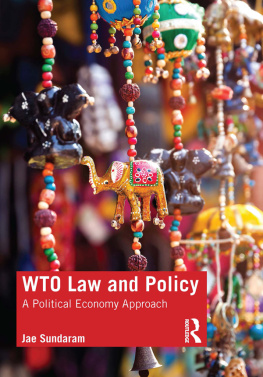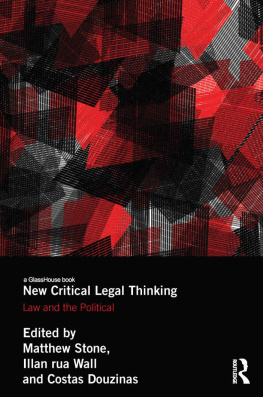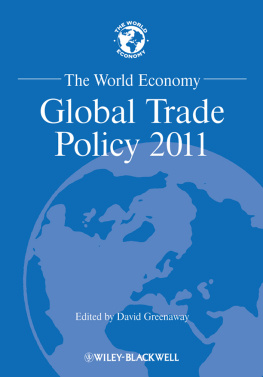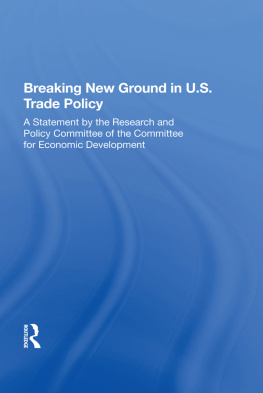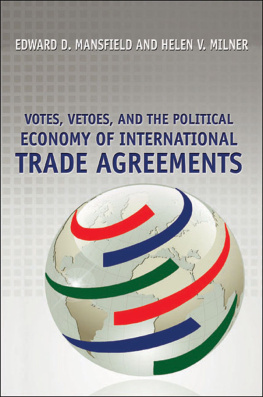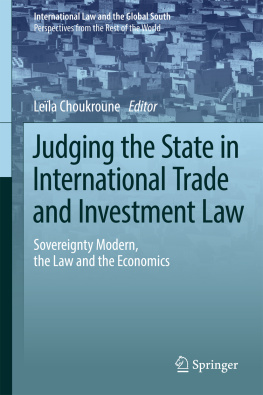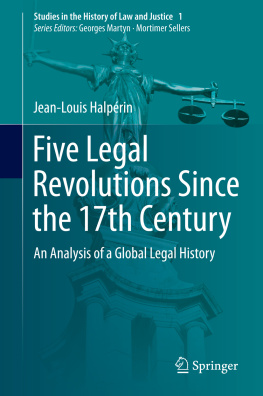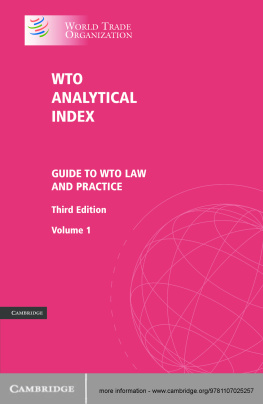Trade Theory and the World Trade Organization
DOI: 10.4324/9780367028183-2
Learning Objectives
This chapter aims to provide the students with
- An introduction to international trade theories;
- An introduction to the classical economic theories of Adam Smith, David Ricardo, and Karl Marx;
- An introduction to liberalism, Keynesian economic thought, and Keyness legacy; and
- An introduction to the economic theories that underpin the WTO.
Introduction
A study of the World Trade Organization and its laws presuppose an understanding of the underlying economic principles that shaped international trade in the twentieth century and how they continue to do so in the twenty-first century. While an overview of the economic principles of the post-World War II era of international trade from the 1940s, as well as during the GATT era before the founding of the WTO in 1995 will shed light on the underlying economic principles that drive the multilateral trade organisations objectives and operations, it may not suffice for the current discourse. As international trade has been an important feature of the world economy for centuries, it will serve our purposes to take a peek into the development of economic thoughts from the sixteenth century onwards, which coincided with the discovery of the New World. This discovery brought unheard of wealth to European shores in the form of gold, silver, and more. It was also a time when mercantilist thought was fast emerging in Europe, supporting the expansion of empires and the founding of nation states, besides the development of international trade. The aforementioned approach will allow us to gain a deeper understanding and appreciation of the underlying theories, principles, and justifications of the international economic order which we currently have in place.
The WTOs economic principles are based on the neoliberal model of capitalism, which is an extension of economic liberalism that emerged in the post-World War II era. The business-to-business (B2B) model of international trade is predicated on the economic principles driven largely by profits and the desire to earn foreign exchange. On the other hand, international trade as performed under the aegis of the WTO does not have the same narrow economic model, as the objectives of the multilateral trade body goes beyond mere profit making, as it has a much wider remit containing non-economic reasons.
International Trade Theories
Although international trades origins can be traced back thousands of years in human history, it is not to be understood that it was performed on the back of a well-thought-out economic policy or even a business plan, for that matter. In the early millennia, there was scepticism about trading with foreigners, and the Greek and Roman writers took differing views on the use of the sea to pursue trade, with some being ambivalent about the advantages of being close to the sea. Writers like Plutarch, though, held the view that in the absence of the sea, man would be savage and destitute, as it promoted exchange amongst different nationalities.
The theory of international trade concerns itself with the causes, the structure, and the volume of international trade and is essentially microeconomic in approach and outlook. The theory of international trade proceeds on the assumption that trade takes place in the form of barter, or money, and the international accounts of a country vis--vis all the others always balance, which means that no balance-of-payment problem exists. International trade theory is contained in three main models, which are (i) the classical theory (Torrens-Ricardo), which states that the determinants of trade are to be found in technological differences between countries; (ii) the Heckscher-Ohlin theory, which stresses the differences in factor endowments between different countries; and (iii) the neoclassical theory, according to which these determinants are to be found simultaneously in the differences between technologies, factor endowments, and tastes of different countries (Gandolfo, 2014).
2.1Mercantilism
Mercantilism was a school of thought that emerged in sixteenth- to eighteenth-century England and amongst the key nation states of continental Europe. It is considered as a long chapter in the history of European economic thought that shaped national economic policies roughly between 1500 to 1800 (Allen, 1991) and is viewed as the precursor to the classical school of economic thought. The term systme mercantile was first used in 1763 by French writer de Mirabeau in a passage in his work Philosophie Rurale, in which he overtly attacked the idea that a nation may profit from the importation of money (Magnusson, 2015). In the 1860s, German writers used the expression Merkantilismus to refer to this particular school of thought, and corresponding terms such as mercantilism in English were used (Viner and Irwin, 1991). It is also to be borne in mind that the word mercantilism has been used in a number of ways and does not have a standard definition.
Although mercantilism was the major economic thought spanning over three centuries, no major theoretical treatises are to be found on the subject. It should be noted that the precepts of mercantilism were the economic components of state building, which provided much of the justification. Vaggi and Groenewegen note that the discovery of the New World and the establishment of colonies in the fifteenth century by European states witnessed a large flow of gold and silver into Europe from Mexico and Peru, which resulted in semi-barter exchanges in markets giving way to more widespread use of money. Most of the gold from the New World was flowing into Spain, which applied bullionist restrictions over a lengthy period of time and imposed the death penalty for exporting gold and silver. Although prohibited from being exported, Spanish gold found its way all over Europe and to some extent was responsible for the long period of inflation.
The cornerstone of mercantilism was the notion that a nations wealth was through the accumulation of gold and silver, and that nations without gold and silver mines could obtain them only by selling more goods than they bought from abroad. England did not have any gold or silver mines, and an export of goods and services to provide for an accumulation of bullion was seen as the way forward, with a unilateral gain in foreign trade and in specie inflow. In short, mercantilism was to steadily grow into an economic theory and political movement which advocated utilising the states military power to ensure internal markets and their supply sources were protected.
Only with the publication of Wealth of Nations, in which Adam Smith interpreted mercantilism as the opposite of the free trade system, was mercantilism constructed into a coherent system (Magnusson, 2015). Mercantilism can be considered as the earliest systematic theorizing in political economy.
Most strikingly, the classical mercantilists favoured national gains through the power of a centralised state, while abandoning the goals of universal good which were promoted earlier under transnational Christendom (Paul and Amawi, 2013). The doctrine elevated the commercial interests to the level of national policy, as it led to government intervention in the market, imposing higher tariffs on foreign goods to restrict import trade, and simultaneously improving export prospects for domestic goods through the grant of subsidies. These measures, according to mercantilists, would ensure more money came into the country, discourage wealth leaving the country, and help maintain a positive balance of trade with a surplus of exports. For the mercantilists, money and gold were the only source of riches which was in limited quantity and to be shared amongst the countries. International trade could not benefit all countries simultaneously.

